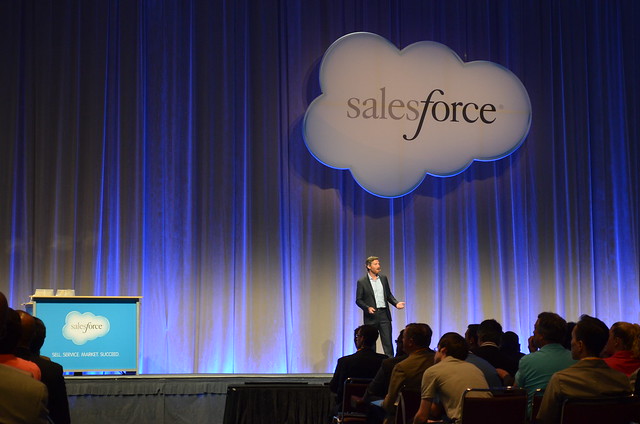Cloud Stocks: Will Salesforce Acquire DocuSign?
According to a recent report, Salesforce.com (NYSE: CRM) was the leader in the global CRM market with 19.5% market share in 2018. Its closest rival SAP was a distant second with 8.3% market share. Analysts believe that 75% of the global spending on CRM in 2019 will be on SaaS-based products, compared with 73% last year. Earlier this week, Salesforce announced its third quarter results that surpassed market expectations. The market was not too pleased with the outlook though.

Photo Credit: Open Grid Scheduler / Grid Engine /Flickr.com
Salesforce’s Financials
Salesforce’s revenues grew 33% over the year to $4.51 billion, above analyst projection of $4.45 billion. Net loss was $109 million, or $0.12 a share, compared with a net income of $105 million, or $0.13 a share a year ago. On an adjusted basis, EPS was $0.75, again better than the Street’s forecast of $0.67.
By segment, Subscription and support revenues grew 34% over the year to $4.24 billion. Professional services and other revenues grew 22% to $274 million. Revenue growth was led by Service Cloud which grew 24% to $1.14 billion and Sales Cloud, which grew 15% to $1.17 billion.
For the fourth quarter, Salesforce expects revenues of $4.74-$4.75 billion with adjusted earnings of $0.54-$0.55 per share. The market was looking for revenues of $4.74 billion with an EPS of $0.61 for the quarter.
Salesforce expects to end the year with revenues of $16.99-$17 billion and adjusted EPS of $2.89-$2.90. The Street had forecast revenues of $16.92 billion for the year with an EPS of $2.86.
For the first quarter of the next fiscal, Salesforce forecast revenues of $4.8-$4.84 billion, falling short of the market’s expected revenues of $4.85 billion. Salesforce’s expectations of $20.9 billion in revenues for fiscal 2021 were also short of the market’s expectations of $20.95 billion.
Salesforce’s Voice Focus
During the quarter, Salesforce continued to upgrade its AI offering – Einstein. It is embedding Einstein in all customer experiences spanning its Salesforce Customer 360 Platform, especially the voice feature. It is also including new solutions for service and sales teams that will apply natural language processing to voice conversations to drive more personalized customer engagement.
Salesforce had introduced Einstein Voice Assistant nearly a year ago. The assistant allowed sales reps to communicate with Salesforce through a conversation. It is now expanding the abilities of this assistant beyond the salesforce to cover any role in the industry. Additionally, by simplifying the process of app development using Einstein Voice Skills, Salesforce will allow organizations to reimagine workflows and processes to drive productivity.
Salesforce has also included Service Cloud Voice in Service Cloud, thus creating an integrated offering of phone, digital channels, and CRM data available real-time to users on a single centralized console. Service Cloud Voice can also integrate with transcription services to convert voice to text in real time.
For the sales team, it introduced the Einstein Call Coaching feature that is included in the Sales Cloud and will help managers by providing them with insights and trends within conversational data. It will be able to identify keywords and alert managers about trends such as a spike in competitor mentions, or best practices or pricing discussions. Organizations can use these insights to deliver customized coaching to its sales reps.
Salesforce also expanded its tie-ups with Amazon recently. It introduced Service Cloud Voice that integrates Amazon Connect with the Service cloud. Traditionally service agents rely on information from multiple sources to address customer needs. With the new integration, customer assets, orders, support history, and other details will be available at a single place for agents. The integration will also allow Amazon Connect to provide AI-powered speech analytics to agents through Service Cloud Voice. Salesforce Einstein can then leverage this information to give recommended answers to agents, provide contextual knowledge articles, and suggest next best actions for the customer within the Service Cloud console.
Potential Acquisitions
Salesforce is targeting revenues of $35 billion by the year 2024. It hopes to achieve that by both acquisitions and product enhancement. In the last 18 months, Salesforce has spent over $24 billion in acquisitions of companies including Tableau, ClickSoftware, Datorama, and Mulesoft. Its acquisition spree is likely to continue in the coming quarters. It could look at adding more content-focused vendors such as DocuSign to compete with the likes of Adobe in that space.
Salesforce already has close ties with DocuSign. DocuSign offers DocuSign eSignature for Salesforce that allows organizations to send agreements for signature, capture information, tracking, and storing without leaving the Salesforce platform. According to reports, 90% of Salesforce’s contracts using DocuSign are signed and completed the same day. DocuSign has also been investing in growth. Last year, it acquired SpringCM in a bid to take on Adobe. DocuSign is currently trading at $70 a share with a market capitalization of $12.3 billion. It expects to end the current year with revenues of $947-$951 million and billings of $1.063-$1.083 billion.
Salesforce’s stock is trading at $161 with a market capitalization of $141.7 billion. It had touched a record high of $167.57 earlier this April. The stock has climbed from its 52-week low of $120.16 that it had fallen to in December last year.
Sramana Mitra is the founder of One Million by One Million (1M/1M), a global virtual incubator that aims to help one million entrepreneurs ...
more


